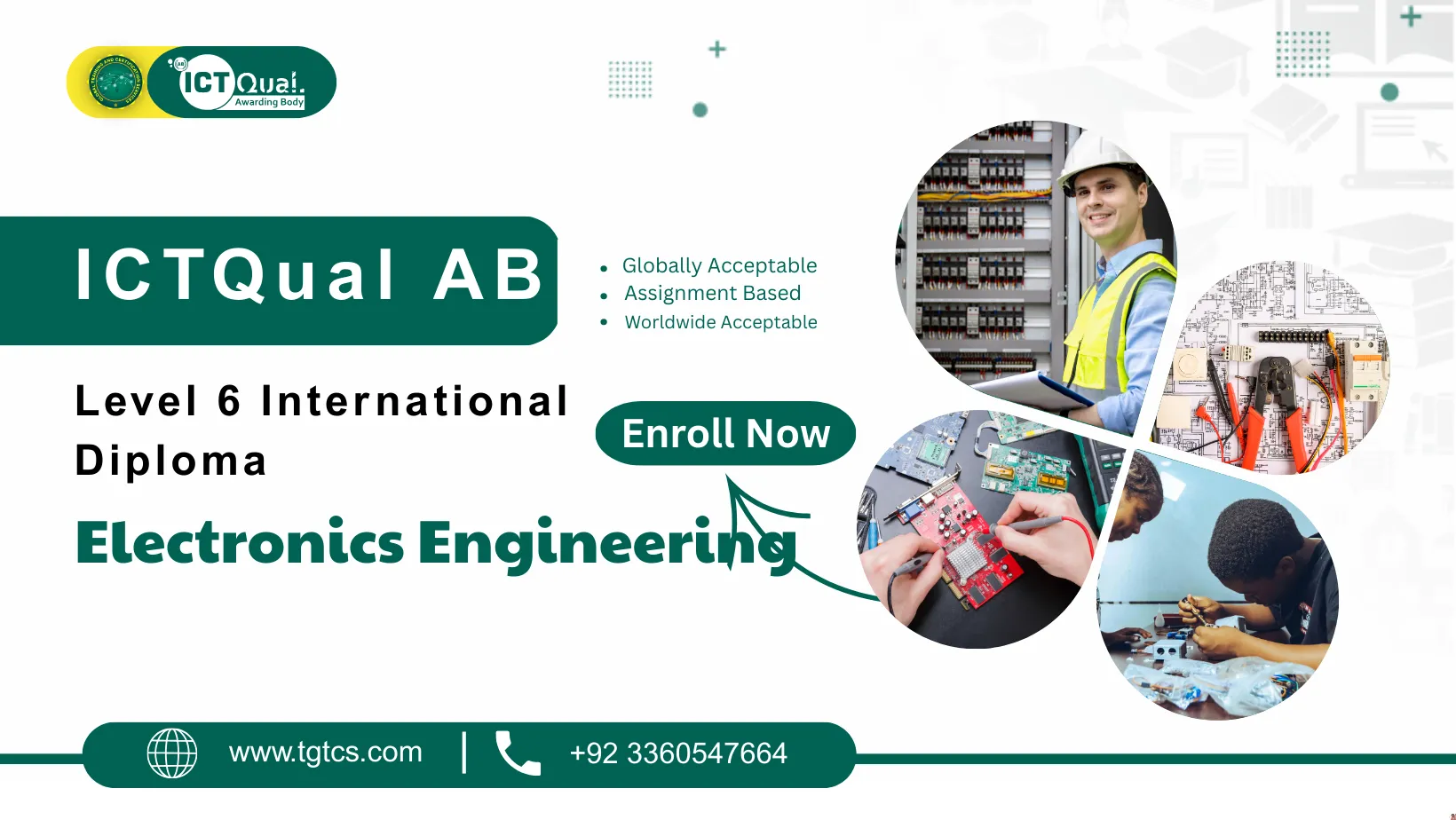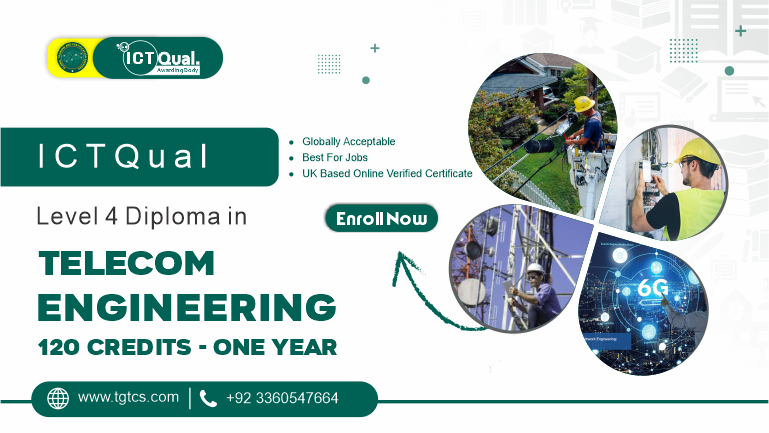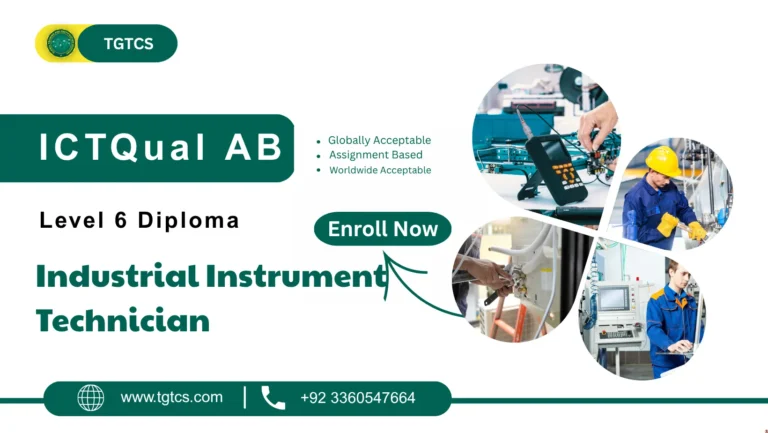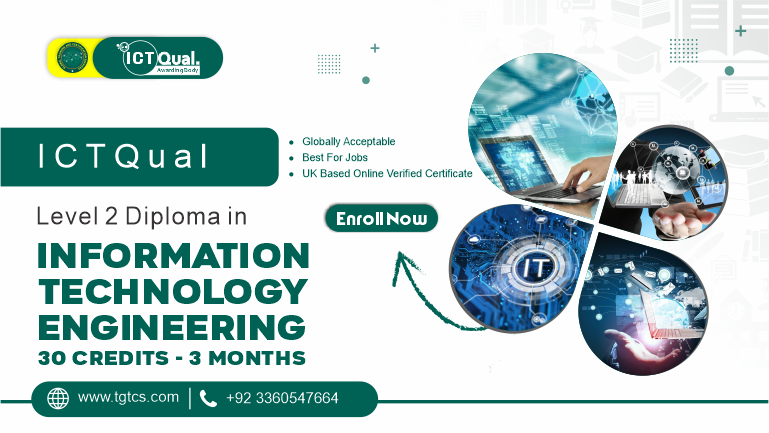ICTQual AB Level 6 International Diploma in Electronics Engineering
The ICTQual AB Level 6 International Diploma in Electronics Engineering is a prestigious, globally recognized qualification designed to equip learners with advanced technical expertise and practical skills in the rapidly evolving field of electronics. As industries worldwide continue to rely on electronic systems for automation, communication, manufacturing, and innovation, the demand for highly qualified electronics engineers has never been greater. This diploma provides learners with the knowledge and competencies required to excel in both local and international markets.
The purpose of this program is to deliver a comprehensive understanding of core electronics engineering concepts, including circuit design, microprocessors, digital and analog systems, embedded technologies, and power electronics. With its structured approach, the diploma balances theoretical foundations with hands-on applications, ensuring that learners not only grasp essential principles but also gain the ability to apply them in real-world engineering environments.
Learners of the ICTQual AB Level 6 International Diploma in Electronics Engineering will develop problem-solving skills, analytical abilities, and technical expertise to design, test, and maintain advanced electronic systems. The program also emphasizes innovation, critical thinking, and adaptability—skills that are vital for success in a competitive global engineering landscape.
By completing this diploma, students open doors to diverse career opportunities in electronics manufacturing, telecommunications, automation, robotics, and research and development. With international recognition and industry relevance, this qualification is an ideal choice for professionals and graduates aiming to advance their careers in electronics engineering.
The Global Training and Certification Services is Approved Training Centre of ICTQual AB UK Ltd
Course Level and Credits
Level 6 International Diploma, 360 credits.
Designed for aspiring engineers, working professionals, and students seeking advanced international qualifications in electronics engineering.
Mode of Study
Fully assignment-based; learn at your own pace.
Accessible from anywhere in the world with flexible options for working professionals and learners.
Global Recognition & Attestation
British Council verifiable, MOFA and Embassy attested.
Recognized for international career advancement, employment, and iqama approval in Gulf countries.
Scope and Purpose
Comprehensive coverage of electronics engineering, including circuit design, embedded systems, microprocessors, digital and analog electronics, and power systems.
Focus on both theoretical foundations and practical applications in real-world engineering environments.
Skills and Knowledge Gained
Advanced expertise in circuit design, microcontrollers, embedded programming, and power electronics.
Practical problem-solving, system analysis, and troubleshooting skills for modern electronic systems.
Innovation, critical thinking, and leadership abilities tailored to electronics engineering projects.
Career Benefits
Opens pathways in electronics manufacturing, telecommunications, automation, robotics, and research and development.
Enhances global employability and professional credibility in advanced engineering roles.
Target Audience
Electronics engineers, technicians, project managers, and students aiming for international careers in electronics and related industries.
Professionals looking to upgrade skills and adapt to emerging technologies in automation and digital systems.
Unique Selling Points (USPs)
Flexible self-paced study, fully assignment-based program.
Globally prestigious and industry-relevant Level 6 diploma.
Ideal for international job opportunities, professional recognition, and iqama approval.
Mandatory Unit
This qualification, the ICTQual AB Level 6 International Diploma in Electronics Engineering, consists of 36 mandatory units.
Year 1 – Foundation in Electronics Engineering
- Principles of Electrical and Electronics Engineering
- Introduction to Circuit Theory
- Digital and Analogue Electronics Fundamentals
- Electronic Components and Devices
- Fundamentals of Signal Processing
- Introduction to Microcontrollers and Embedded Systems
- Health, Safety, and Environmental Awareness
- Electrical Measurement and Instrumentation
- Laboratory Techniques in Electronics
- Technical Report Writing
- Introduction to Simulation and Design Software
- Basics of Power Electronics
Year 2 – Intermediate Electronics Engineering
- Advanced Circuit Design and Analysis
- Embedded System Programming
- Communication Systems Fundamentals
- Sensors, Transducers, and Instrumentation
- Power Electronics and Motor Control
- Microprocessor Architecture and Applications
- Process Control and Automation in Electronics
- Data Acquisition and Signal Conditioning
- Project Planning and Technical Communication
- Quality Control and Assurance in Electronics Systems
- Advanced Laboratory Techniques
- Electronics Standards, Safety, and Compliance
Year 3 – Advanced Electronics Engineering
- Advanced Embedded Systems and IoT Applications
- Robotics and Automation Systems
- Advanced Signal Processing Techniques
- Wireless and Telecommunication Systems
- Electronic System Design and Optimisation
- Power Systems and Renewable Integration
- Risk Assessment and Safety in Electronics Projects
- Advanced Laboratory Experiments and Testing
- Supply Chain and Logistics in Electronics Industry
- Capstone Project in Electronics Engineering
- Professional Development and Leadership in Engineering
- Strategic Decision-Making in Electronics Projects
The ICTQual AB Level 6 International Diploma in Electronics Engineering is designed to equip learners with advanced knowledge, technical expertise, and practical problem-solving skills in the field of electronics
Year 1 – Foundation in Electronics Engineering
Principles of Electrical and Electronics Engineering
- Understand the core principles of electrical and electronic systems.
- Apply Ohm’s Law, Kirchhoff’s laws, and fundamental circuit concepts.
- Differentiate between AC and DC circuits and their applications.
- Develop problem-solving skills in basic electronic engineering contexts.
Introduction to Circuit Theory
- Analyze simple and complex electrical circuits using theoretical models.
- Apply mesh and nodal analysis in circuit problem-solving.
- Understand Thevenin’s and Norton’s theorems for circuit simplification.
- Evaluate practical applications of circuit theory in engineering.
Digital and Analogue Electronics Fundamentals
- Distinguish between digital and analogue signals.
- Apply Boolean algebra and logic gates in digital system design.
- Explain the operation of amplifiers, oscillators, and filters.
- Develop basic electronic circuits using digital and analogue techniques.
Electronic Components and Devices
- Identify and classify active and passive electronic components.
- Explain the characteristics and functions of diodes, transistors, and ICs.
- Evaluate performance parameters of electronic devices.
- Select appropriate components for specific electronic applications.
Fundamentals of Signal Processing
- Understand the concepts of analog and digital signal processing.
- Apply Fourier and Laplace transforms in analyzing signals.
- Design basic filters for signal manipulation.
- Evaluate noise effects and methods of signal enhancement.
Introduction to Microcontrollers and Embedded Systems
- Understand the architecture of basic microcontrollers.
- Apply programming techniques for embedded applications.
- Interface sensors and actuators with microcontrollers.
- Demonstrate applications of embedded systems in real-world projects.
Health, Safety, and Environmental Awareness
- Apply health and safety regulations in engineering workplaces.
- Conduct risk assessments in electronic laboratories.
- Promote sustainable and environmentally responsible engineering practices.
- Demonstrate compliance with industry safety standards.
Electrical Measurement and Instrumentation
- Understand measurement principles and accuracy in instrumentation.
- Operate multimeters, oscilloscopes, and specialized instruments.
- Evaluate data from electrical and electronic measurements.
- Apply calibration and error analysis techniques.
Laboratory Techniques in Electronics
- Apply safe laboratory practices in electronic experiments.
- Operate tools and equipment for circuit assembly and testing.
- Collect, record, and analyze experimental data.
- Develop practical problem-solving approaches in laboratory environments.
Technical Report Writing
- Understand the structure and format of technical reports.
- Present engineering data effectively using graphs, charts, and tables.
- Apply academic and professional writing standards.
- Communicate findings and recommendations clearly.
Introduction to Simulation and Design Software
- Operate simulation tools such as MATLAB, Multisim, or Proteus.
- Model and simulate electronic circuits and systems.
- Analyze simulation outputs for accuracy and reliability.
- Apply software-based tools to complement practical experiments.
Basics of Power Electronics
- Understand the fundamentals of rectifiers, inverters, and converters.
- Apply semiconductor devices in power electronics circuits.
- Analyze power electronic applications in motor control and power supply.
- Evaluate efficiency and performance of power systems.
Year 2 – Intermediate Electronics Engineering
Advanced Circuit Design and Analysis
- Apply advanced mathematical techniques to circuit analysis.
- Design circuits using operational amplifiers and advanced components.
- Evaluate frequency response and stability of electronic systems.
- Troubleshoot and optimize complex circuits.
Embedded System Programming
- Develop embedded applications using C/C++ and assembly language.
- Implement interrupt-driven programming in microcontrollers.
- Integrate embedded software with hardware systems.
- Optimize code for real-time system performance.
Communication Systems Fundamentals
- Understand the principles of analog and digital communication.
- Explain modulation and demodulation techniques.
- Apply coding and error detection methods in communication systems.
- Evaluate communication system performance under different conditions.
Sensors, Transducers, and Instrumentation
- Understand working principles of sensors and transducers.
- Apply sensors in measurement and control systems.
- Integrate transducers with data acquisition systems.
- Evaluate instrumentation performance in practical applications.
Power Electronics and Motor Control
- Understand principles of AC/DC motor control using electronics.
- Design power circuits for industrial motor applications.
- Apply PWM and control strategies for efficient performance.
- Evaluate safety and performance in motor control systems.
Microprocessor Architecture and Applications
- Understand internal architecture of microprocessors.
- Interface microprocessors with memory and peripheral devices.
- Develop programs for basic computational and control tasks.
- Evaluate microprocessor applications in industrial systems.
Process Control and Automation in Electronics
- Understand control system fundamentals in industrial processes.
- Apply PLC programming and automation techniques.
- Integrate sensors, actuators, and controllers in automated systems.
- Evaluate efficiency and reliability of process control systems.
Data Acquisition and Signal Conditioning
- Understand data acquisition systems and their applications.
- Apply analog-to-digital and digital-to-analog conversion techniques.
- Design signal conditioning circuits for improved accuracy.
- Integrate data acquisition systems into practical applications.
Project Planning and Technical Communication
- Apply project management principles in engineering projects.
- Develop technical communication strategies for engineering teams.
- Create detailed project documentation and reports.
- Manage timelines, resources, and risks in electronics projects.
Quality Control and Assurance in Electronics Systems
- Understand quality assurance standards in electronics.
- Apply testing and inspection methods for quality control.
- Evaluate reliability and durability of electronic systems.
- Implement corrective and preventive actions in quality processes.
Advanced Laboratory Techniques
- Apply advanced experimental techniques in electronics.
- Operate precision equipment for system testing.
- Collect high-quality data for detailed analysis.
- Troubleshoot complex systems in laboratory conditions.
Electronics Standards, Safety, and Compliance
- Understand international electronics standards and compliance.
- Apply safety codes and industry regulations.
- Evaluate systems for compliance with ISO and IEC standards.
- Promote workplace safety and ethical engineering practices.
Year 3 – Advanced Electronics Engineering
Advanced Embedded Systems and IoT Applications
- Design advanced embedded systems with IoT integration.
- Apply cloud computing and wireless protocols for IoT.
- Develop IoT-based automation and monitoring applications.
- Evaluate security and scalability of IoT systems.
Robotics and Automation Systems
- Understand fundamentals of robotics and mechatronics.
- Program robotic systems for industrial and service applications.
- Integrate sensors and actuators in robotic systems.
- Evaluate performance and safety in robotics applications.
Advanced Signal Processing Techniques
- Apply digital signal processing algorithms in real-world problems.
- Analyze signals using FFT, wavelet, and filter design techniques.
- Implement signal processing applications in communication and control.
- Optimize systems for noise reduction and performance.
Wireless and Telecommunication Systems
- Understand cellular, satellite, and wireless communication systems.
- Apply frequency modulation and multiplexing techniques.
- Evaluate performance of wireless networks and protocols.
- Design systems for telecommunication applications.
Electronic System Design and Optimisation
- Apply CAD tools for electronic system design.
- Optimize systems for cost, performance, and sustainability.
- Troubleshoot design issues in complex projects.
- Evaluate system performance against design requirements.
Power Systems and Renewable Integration
- Understand the role of electronics in power generation and distribution.
- Apply power electronics in renewable energy systems.
- Integrate solar, wind, and hybrid systems with power grids.
- Evaluate efficiency and sustainability of power systems.
Risk Assessment and Safety in Electronics Projects
- Conduct risk analysis for electronic systems and projects.
- Apply safety protocols in project development.
- Manage hazards related to electronic design and implementation.
- Promote compliance with health, safety, and environmental standards.
Advanced Laboratory Experiments and Testing
- Design advanced experiments for testing electronic systems.
- Apply precision testing methods in research and development.
- Analyze and interpret experimental data at advanced levels.
- Validate designs through systematic testing.
Supply Chain and Logistics in Electronics Industry
- Understand global supply chain processes in electronics.
- Evaluate procurement and logistics strategies.
- Apply quality control in supply chain management.
- Manage risks and sustainability in electronics supply chains.
Capstone Project in Electronics Engineering
- Apply cumulative knowledge to an independent engineering project.
- Demonstrate advanced research and problem-solving skills.
- Develop innovative solutions to real-world electronics challenges.
- Present professional reports and defend findings effectively.
Professional Development and Leadership in Engineering
- Develop leadership skills in managing engineering teams.
- Apply professional ethics and practices in global engineering contexts.
- Enhance career planning and continuous development in engineering.
- Promote innovation and adaptability in professional practice.
Strategic Decision-Making in Electronics Projects
- Apply strategic planning in project management.
- Evaluate financial, technical, and risk factors in decisions.
- Demonstrate critical thinking in project leadership.
- Enhance organizational performance through informed decision-making.
The ICTQual AB Level 6 International Diploma in Electronics Engineering is designed to provide learners with advanced technical expertise, practical problem-solving skills, and global recognition to thrive in the electronics industry.
Advanced Technical Knowledge
- Gain in-depth understanding of electronics, embedded systems, power electronics, and automation.
- Develop strong analytical and design skills in circuits, microprocessors, and telecommunications.
- Learn advanced techniques in robotics, IoT applications, and renewable energy integration.
Hands-On Practical Experience
- Apply laboratory techniques and use industry-standard testing equipment.
- Engage in real-world projects, simulations, and capstone research.
- Strengthen troubleshooting and optimization skills in electronics systems.
Career Advancement Opportunities
- Enhance employability in industries such as telecommunications, automation, energy, and manufacturing.
- Qualify for roles like Electronics Engineer, Embedded Systems Specialist, and Telecommunications Engineer.
- Improve eligibility for leadership and project management positions.
Global Recognition and Attestation
- British Council verifiable, MOFA, and Embassy attested qualification.
- Recognized internationally for job opportunities, career progression, and iqama approval in Gulf countries.
- Enhances global mobility for engineering professionals.
Skill Development for Future Technologies
- Gain expertise in IoT, robotics, smart grid systems, and advanced telecommunications.
- Build adaptability to emerging trends in electronics engineering.
- Develop innovative problem-solving approaches for sustainable and high-tech solutions.
Flexible Learning Pathway
- Fully assignment-based structure for self-paced study.
- Accessible globally, making it ideal for working professionals.
- Balances theoretical knowledge with applied engineering practices.
The ICTQual AB Level 6 International Diploma in Electronics Engineering is carefully designed for learners who aim to enhance their technical expertise, advance their careers, and contribute to innovation in the electronics industry.
Fresh Engineering Graduates
- Ideal for students completing undergraduate studies who want to gain advanced international-level expertise in electronics.
- Provides a strong academic and practical foundation for career entry in electronics, telecommunications, and automation.
Working Professionals in Engineering
- Perfect for professionals already working in electronics, electrical, or related fields who seek career advancement.
- Helps enhance leadership, project management, and decision-making skills for higher-level roles.
Aspiring Electronics Engineers
- Suitable for learners who want to build careers in circuit design, embedded systems, robotics, or telecommunication.
- Equips learners with the skills to design, analyze, and optimize electronic systems for real-world applications.
Innovators and Technology Enthusiasts
- Best for individuals passionate about emerging technologies like IoT, smart grids, renewable integration, and automation.
- Encourages innovation, research, and problem-solving to meet the growing demand for sustainable and advanced electronics solutions.
International Career Seekers
- Ideal for candidates aiming to secure globally recognized qualifications for better job opportunities abroad.
- Provides British Council verifiable, MOFA, and Embassy attested certification, enhancing employability worldwide.
Course Overview
Course Level
Level 6
Course Units
36 Units
Credits
360
Duration
3 years






